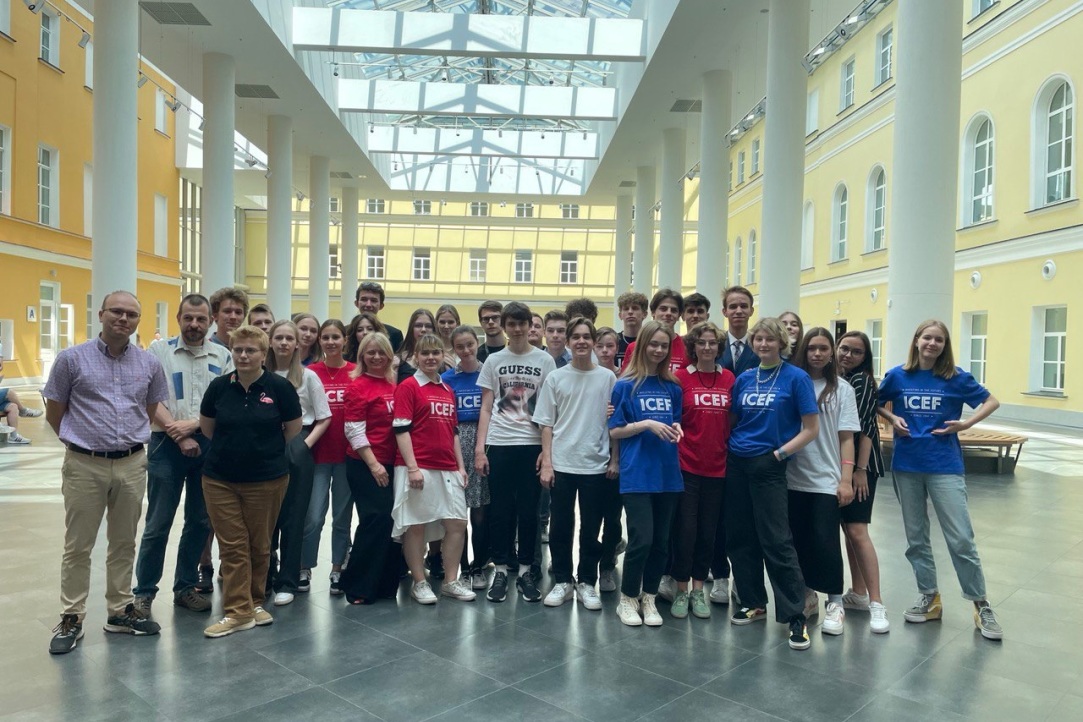10 Days with ICEF: Letovo School Students in the Role of College Students

ICEF has completed its 10-day training programme for tenth grade students of Letovo School. The training welcomed 30 students and involved university lab work, business case studies, and tours of some of the largest players on the Russian market.
For 10 days the Letovo School students could immerse themselves in the experience of being college students. For this, they were offered a choice of tracks which involved testing hypotheses at the International Laboratory for Experimental and Behavioural Economics, receiving professional career guidance, and solving cases with “School-Academy”. The Company track, hosted by ICEF Career Services, was of a more general nature and took the guys to the offices of Kept and Ozon to meet their staff and learn about job responsibilities and candidate requirements.
Day 1
The training began with a tour of HSE campus in Pokrovsky Boulevard and two lectures. The first one had its focus on the economics and finance career paths that are available on today’s labor market, discussing stock markets and financial instruments, calculating the probability of robots replacing financial officers, and unveiling the subtleties of the industry. The second lecture focused case studies and methods for solving business tasks.
Day 2
Day 2 took the trainees to the Moscow-City to meet Kept (a member of KPMG multinational network until June 8, 2022) and was preceded by the group debriefing a dedicated business case with their tutors, which involved real-life market research and was meant to be a comprehensive illustration of Kept consultant’s role. That case received more detailed feedback from Kept consultants themselves, who acted as clients.
Polina Solodchik, an expert at Kept, gave a lecture on how to find vocation amid the vastness of job market, followed by a series of talks from Kept consultants which helped to shed more light on the consultant’s role and how communication should be built with each specific client.
Day 3
The tour of Ozon, namely its division Ozon Fintech, was, too, preceded by solving a business case study. The latter, examined by the trainees with the support from ICEF students and alumni, was designed to be an introduction to FMCG sector.
Ozon Fintech is a unique team of highly skilled experts, some of whom hold degrees from ICEF. They gave detailed presentations of Ozon’s digital technologies and services, focusing on the updates to banking sector and product/project management strategies. In their talk, the managers of three Ozon Fintech units discussed how the knowledge of finance and economics is being applied in innovation and development and how finance officer jobs might evolve in the future. At the end of the meeting the students were given homework.
Those trainees who followed the research-oriented track combined company visits with studies at the Laboratory for Experimental and Behavioral Economics. Having learned the basic concepts and statistical data analysis methods, they split into groups and went on to work on economics projects which involved experimenting, interviewing, data sourcing, hypotheses testing, and discussions with mentors. By working on those projects and presenting them to the Laboratory team, the trainees gained experience as researchers. They also received feedback from the head of the Laboratory, Alexey Belyanin, and were given books on behavioral economics as gifts.
Day 4
“It’s not what you say, it’s how you say it” – Day 4 was dedicated to building self-presentation and communication skills by practicing live performance and teamwork and learning to deal with negative experiences. Those sessions generated some key messages and takeaways – that best improvisation is prepared improvisation, that skillful presenters are the ones who know how to get the message across within 30 seconds, 60 minutes and throughout the presentation, among others.
In the second half of the day, the teams played the simulator game called Stock Market, with ‘real-time’ stock market news, quotes and prices.
Day 5-9
Day 5 to 9 kept the teams busy working on their business projects. Discussions with mentors, idea concept formulation and presentation of solutions were followed by drawing up of implementation plans. The final, and very important, part of the work was calculating unit economics for the proposed business ideas and financial models.
The final lecture was on finance. Highlighting the best financial modeling practices, it refreshed the students’ knowledge of the key financial metrics and had proved a useful tool in their project work. In working on their final presentations, the students really made the most of their teamwork.
Day 10
Day 10 welcomed presentation of the teamwork projects, rather case solutions, to the board of tutors, lecturers and company officers, the latter acting as clients. All the presented case solutions proved to have the ingenuity and attention to detail to be considered ready-to-use. The key criterion was not only the quality of presentation and result itself, but also the problem-solving approach and ability to use financial modeling techniques, elaborate alternatives and formulate hypotheses. All this has given the trainees the knowledge of how ideas can be generated to be drivers of the market.
Assessing the teams’ performance was the jury of Ozon and Kept representatives, guest speakers and faculty of ICEF Evening School. The students received feedback and some valuable recommendations on how to propel their projects to the next level. The training ended with gift giving ceremony and taking group photos in the campus atrium. Among the guest speakers were the officials of Alfa-Bank and MARS.
ICEF will continue to use this form of work with high school students. There is a plan to host similar training sessions during the autumn holidays of 2022. And given the positive feedback from the recent group of students, there will be more schools willing to join. This form of interaction between universities and schools offers a powerful tool for raising career awareness among the younger generations.